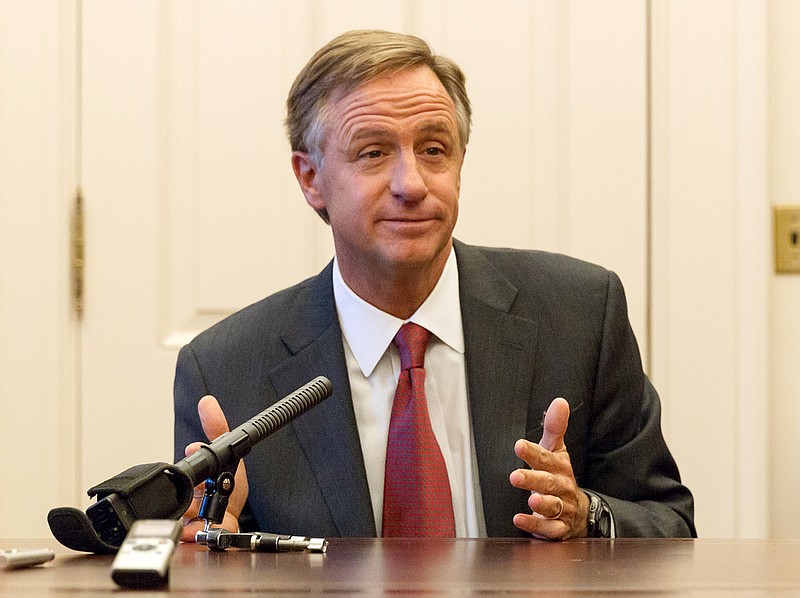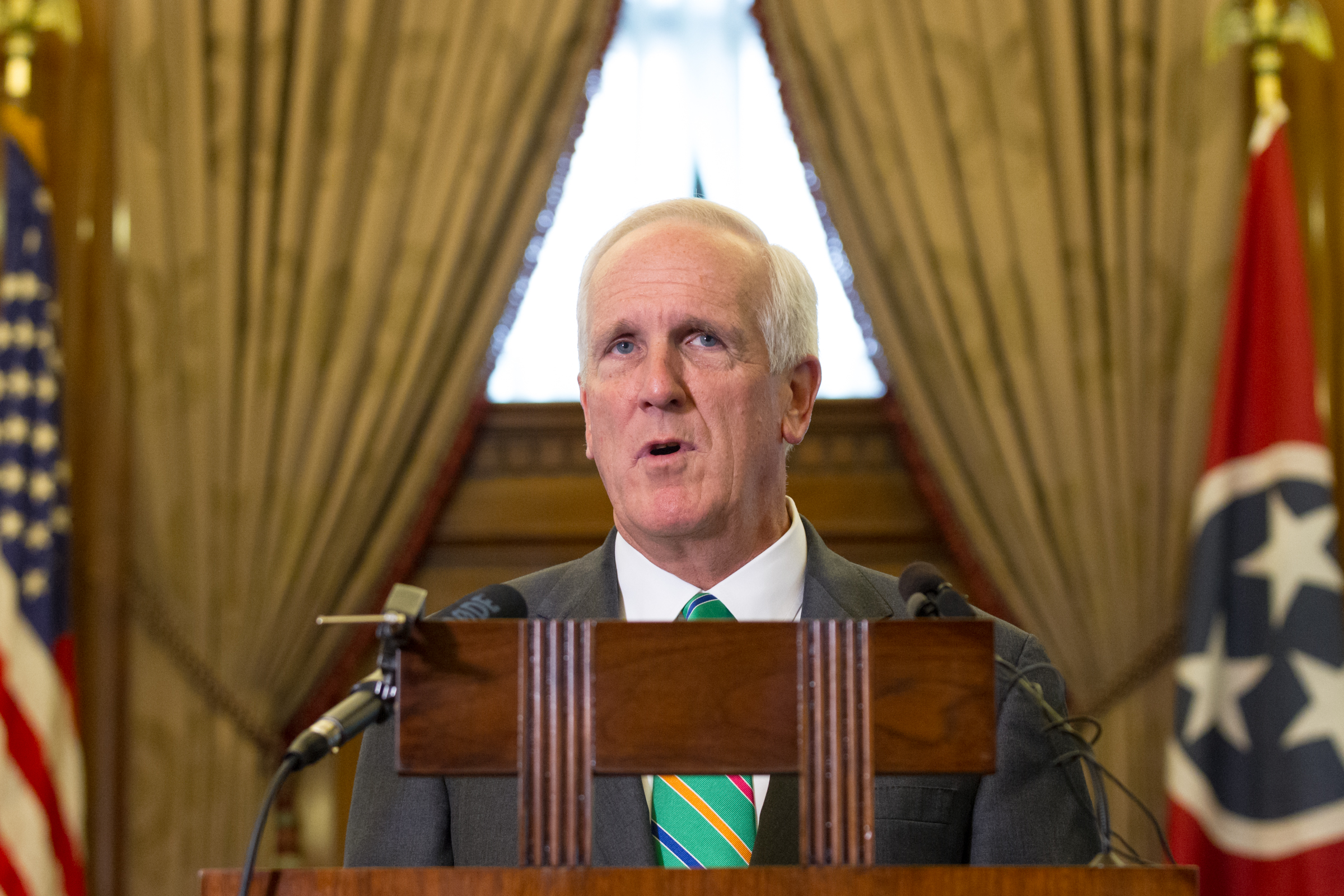NASHVILLE - So, two guys with their newly-issued marriage license stroll into Tennessee Gov. Bill Haslam's Capitol office suite in hopes of getting the governor to perform the ceremony, and ...
This isn't a set-up for a joke. It's an illustration of possible scenarios playing out in Tennessee under the U.S. Supreme Court's landmark ruling last week that legalized same-sex marriages across the country.
In Tennessee, easily more than a thousand state and local officials are "persons who may solemnize marriages," and many do. The list includes county commissioners, county clerks, city and county mayors, the state House and Senate speakers, judges of all stripes and, of course, the governor. Even retired officeholders in some cases.
"Officials authorized to conduct ceremonies may do so at their discretion," Tennessee Attorney General Herbert Slatery III said last week. "There's no obligation under state law to solemnize a state marriage. Our statute says an official 'may' solemnize the rite of marriage."
Some officials, like county clerks whose offices issue marriage licenses, may solemnize marriages more frequently. Others may do so very occasionally.
But now, any public official who performs marriages must not discriminate between male-female and same-sex couples, Slatery said. Though he criticized the Supreme Court's decision, Slatery told Tennessee officials on Friday to begin issuing marriage licenses for same-sex couples.
"[In] light of the decision clearly establishing a constitutional right to marry, we think that the wise decision is to comply with the case and promptly issue the marriage licenses," he advised county clerks.
"Our best advice in these instances is pretty simple: Do not discriminate. That's the holding of the court today."
Haslam presided over the marriages of his son and at least one of his daughters, but he opposes same-sex marriage.
"As a civil servant, I can perform marriages, and I've done some," Haslam told reporters in Memphis on Friday, shortly after the Supreme Court issued its ruling.
"But only with someone I've known for a long time. That's not something I intend to be doing."
Actually, the governor or other public officials who perform occasional ceremonies for relatives and close friends probably wouldn't be affected, said Chris Sanders, executive director of the Tennessee Equality Project, which advocates on behalf of gay, lesbian and transgender people.
"My guess is that the governor would probably get a lot more leeway than a clerk would," Sanders said. "It's not that that's written in the code anywhere. It's just since the governor isn't doing too many to begin with, he'd probably stick to the natural proposition that he's doing it for close family and friends, and on that basis it's not discriminary on the basis of they are or aren't a same-sex couple."
But, Sanders said, "Ask him how many of his friends are gay."
Slatery's advice appears to have prompted at least one Middle Tennessee county clerk to declare he would stop performing marriage ceremonies, even though his office can't refuse to issue marriage licenses to gay and lesbian couples..
Wayne County Clerk Stan Horton on Friday signed and posted a "to whom it may concern" notice that quickly made the rounds on social media:
"As of June 26, 2015 there will be no marriage ceremonies performed in the Wayne County Clerk's office by Clerk Stan Horton neither will marriages be performed by deputy clerk's [sic], this decision not only reflects inside the office but also outside the boundaries of the office."
Sanders said Horton's "timing obviously seems to be related to the Supreme Court's decision." And that's not good, he added.
"It'll make it difficult for all couples in that county," he said Saturday. That would include straight couples who aren't in a church congregation and don't know a public official who could marry them, he said.
"There are poor, unconnected straight couples in the county who want to get married and don't know the people in the county at all. They just want to get married. They're maybe not in a church. It'll make it tougher for everyone."
Sanders said the Equality Project has heard that one or two other clerks may stop performing marriages.
On the other hand, he said, three Metro council members in Nashville rushed to the courthouse to preside over ceremonies. Among them was Megan Barry, a mayoral candidate, who performed Nashville's first legal marriage for a lesbian couple she knew.
He estimated some 200 same-sex couples in Tennessee obtained marriage licenses across the state on the first day.
Hamilton County Clerk Bill Knowles said his office issued four licenses to same-sex couples. He said the issue of discrimination "won't be a problem for me" because he rarely officiates.
"In my 40 years, you can count how many I married on both my hands," Knowles said. "I just don't do the marrying. I leave that up to the ministry or other civil officials who want to get into that. I just don't have the time, really, to stay at the office and marry people."
Even after Slatery advised clerks that they must issue marriage licenses, some clerks held back on Friday.
WRKN-TV in Nashville reported the Robertson County clerk's office will now require appointments for all couples wanting a marriage license. Clerk Susan Atchley told the station she plans to talk to other county clerks around the state this weekend for guidance.
Meanwhile, the debate continues on other impacts of Friday's decision.
Tennessee lawmakers had passed a Religious Freedom Restoration Act that was intended to ensure business' religious freedom rights regarding same-sex ceremonies.
"Well, I think that remains to be seen," Slatery told reporters. "Obviously, any exercise by the state or state officials may be subject to some scrutiny if they were doing that under the Religious Freedom Restoration Act."
There are arguments whether ministers, rabbis and imams would have to perform same-sex ceremonies. Sanders said they wouldn't, but others, including Slatery, said there could be issues down the road.
Contact Andy Sher at asher@timesfreepress.com or 615-255-0550.

